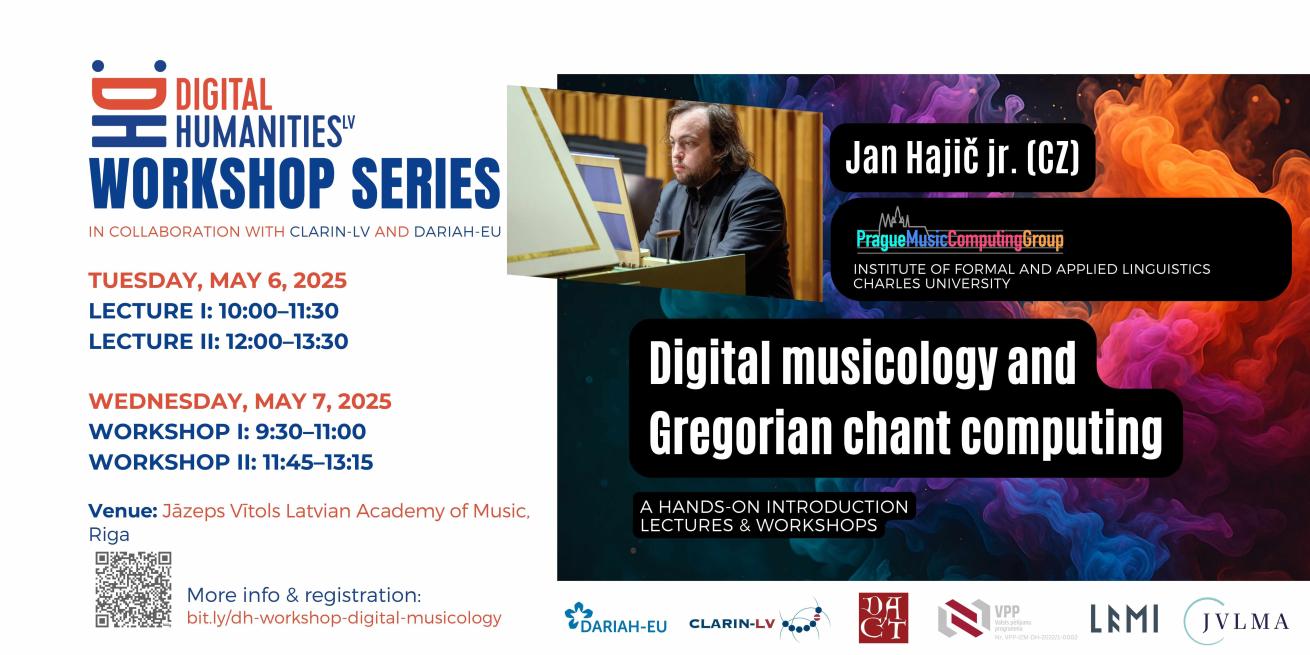Lectures and workshops by PhD Jan Hajič on “Digital Musicology and the Computational Analysis of Gregorian Chant” will take place in Riga on May 6–7

Lectures and Workshops by Jan Hajič, PhD:
Digital Musicology and the Computational Analysis of Gregorian Chant
📍 Jāzeps Vītols Latvian Academy of Music (K. Barona iela 1, Riga)
🗓 May 6–7, 2025
We warmly invite you to a two-day event featuring lectures and hands-on workshops by Jan Hajič, PhD, who will introduce participants to digital musicology, its strengths, and its limitations. The sessions are intended for musicologists and musicians at all levels—from students working on their theses to senior researchers planning grant applications. Prior knowledge of computer science is not required, though tech-savvy musicians and music-minded computer scientists are very welcome!
📅 Schedule
May 6 (Room 102)
🕙 10:00–11:30 — Lecture I: What Is Digital Musicology?
🕛 12:00–13:30 — Lecture II: The Current State of Optical Music Recognition (OMR)
May 7 (Room 120)
🕘 09:30–11:00 — Workshop I: Exploring the Digital Ecosystem of Gregorian Chant
🕦 11:45–13:15 — Workshop II: Mode Analysis and Discovering Undocumented Chants
📌 Registration
Participation is free of charge, but registration is required.
Please register by April 30 via this form:
👉 https://forms.gle/rL2h1DogqwEnYGAfA
Note: Please bring your own laptop for the workshops.
Language of instruction: English
📧 For more information: dh@lulfmi.lv
📚 Session Summaries
Lecture I – What Is Digital Musicology?
This session introduces digital musicology in an accessible way—what it is, how it works, and why it deserves dedicated attention. No programming experience is needed, but curious computer scientists are welcome!
Lecture II – The Current State of Optical Music Recognition (OMR)
OMR converts scanned images of music notation into editable digital data. Despite progress in computer vision, OMR remains a challenging task. The lecture provides an overview of current tools, their limitations, and resources available for those wishing to apply OMR to their collections.
Workshop I – Exploring the Digital Ecosystem of Gregorian Chant
A hands-on introduction to digital chant databases and indexes. Participants will explore chant data, view basic statistics, and learn to visualize results in Google Colab—no installations or programming knowledge required, though basic Python skills are helpful.
Workshop II – Mode Analysis and Discovering Undocumented Chants
This session focuses on the modal structure of Gregorian chant, using ecological modeling to estimate how many chants might still be undiscovered—an example of how computational methods provide insights beyond traditional musicological approaches.
👤 About Jan Hajič, PhD
Dr. Jan Hajič leads the Computational Musicology Group at the Faculty of Mathematics and Physics, Charles University, Prague. He is a principal investigator in international projects on early music research, OMR, deep learning, and computational analysis. He recently completed the Melody Genome Project, applying bioinformatics to chant research, and leads the OmniOMR project on deep learning-based manuscript recognition. He is also an accomplished harpsichordist, performing regularly with early music ensembles across Europe, including at the 2023 Prague Spring Festival with Andreas Scholl at the Baroque opera theatre in Český Krumlov.
💡 Organized in collaboration with:
-
CLARIN-LV and DARIAH-EU research infrastructures
-
Computational Musicology Group (Prague)
-
University of Latvia, Institute of Literature, Folklore and Art
-
Jāzeps Vītols Latvian Academy of Music
-
Project “Digital Analysis of Gregorian Chant”
This event is supported by the project
“Development of an Open and FAIR-Compliant Digital Humanities Ecosystem in Latvia” (VPP-IZM-DH-2022/1-0002), funded by the Latvian Ministry of Education and Science.